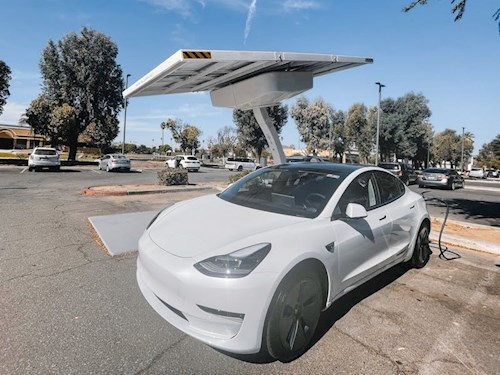

Electric vehicles (EVs) are more popular than ever, with the number of Wisconsin registrations growing each year. In fact, combined registrations of EVs and hybrids rose 53% from 2021, with the highest concentration in Dane County. And these numbers are expected to grow significantly with new, expanded tax credits and instant rebates from the Inflation Reduction Act (IRA).
However, the market penetration for EVs in Wisconsin is still low, hovering at less than 2%. Many consumers cite cost as one of the top concerns with making the switch. In reality, however, going with an EV will save you money over the lifetime of the vehicle and the breakeven point is now even sooner with new IRA EV incentives.
Purchasers of new EVs are eligible for up to $7,500 in instant rebates for qualified vehicles. Used EVs may be eligible for up to a $4,000 tax credit, or 30% of the sales price. And best of all, the new IRA EV incentives allow for instant rebates instead of receiving the incentive via a tax credit, meaning that the purchase price is reduced at the point of sale.
Instant rebates are simpler for the purchaser compared to other tax credits available through the Inflation Reduction Act because:
For purchasers looking to select a new EV and qualify for up to a $7,500 rebate, the EV must be on a list of qualifying vehicles, which is based on battery capacity, weight limits, whether it is an eligible manufacturer, and other criteria.
To qualify for a used EVs eligible for up to a $4,000 tax credit, or 30% of the sales price: the used vehicle must be at least two years old, less than $25,000, purchased from a dealership, and only used once per vehicle (meaning the previous owner cannot have taken advantage of a tax credit or rebate).
For consumers looking at either a used or new EV, income limits will apply (joint tax return <$300,000; head of household <$225,000; single-payer <$150,000).
If your income is too high to qualify for a rebate or you want to purchase an EV that isn’t on the list for individual tax credits, leasing might be a better option. When leasing a new EV, the company leasing you the vehicle can access a different, commercial vehicle EV tax credit. Typically companies will pass the tax credit savings onto you as the person paying for the lease.
To qualify for assistance to install EV charging infrastructure, the equipment must be placed in a low-income community or a non-urban area. Qualifying individuals can receive a 30% tax credit, up to $1,000 for installation. Additionally, Drive Electric Wisconsin’s Utility Search can connect you with incentives offered through your electric company.
Overall, EVs are less expensive to own and operate than comparable gas-powered cars. On average, electric vehicles will break even on cost against gas-powered cars between 5-10 years after purchasing. Where this threshold lands for you depends on a number of factors, including the type of car you purchase and its up front sticker price, how much you drive, whether you install an at-home charger, and other factors. However, one study found that EV owners over the life of the vehicle (10 years) can save up to $23,000 going with an EV truck. Likewise, the modeled savings for a Chevy bolt EUV (a sedan) was $12,600.
Part of these cost savings are due to the reduced maintenance costs. EVs have fewer moving mechanical parts, resulting in less repair needs and greater reliability. In fact, one study found that EV’s cut repair and maintenance costs by 50% compared to their gas-powered counterparts! And beyond maintenance, EV owners who do most of their charging at home generally save between $800-$1000 per year on fuel costs.
In turn, however, insuring EVs can be more expensive than gas-powered cars because if the car is damaged the replacement cost is generally higher (as batteries are often very expensive to replace in EVs). In addition, the depreciation of an EV’s value over time is higher than a gas-powered car.
To make the breakeven point comparison easy though, check out this tool from the U.S. Department of Energy, which allows you to enter in which vehicles you’re considering, how many miles you expect to drive per week, etc. and compares the long-term cost of each over time.
What’s great is that the new instant rebates tip the scales significantly in favor of purchasing an EV as a cost-effective option. And an EV has the added bonus of being more environmentally-friendly. So in addition to saving money over the life of the vehicle, you will gain the satisfaction of knowing that your car is safer and quieter to drive, while reducing greenhouse gas emissions!
When you’re ready to start shopping, dealerships throughout Dane County have EV’s with a wide range of options to choose from depending on the needs, lifestyles, and price point of consumers. As of February 2024, there are 37 EV models available for less than $48,000 and 10 EV models available for less than $35,000. You don’t have to give up your favorite car brand to go electric, with dealers including BMW, Chevrolet, Ford, Nissan, Hyundai, GMC, and more. Check out MG&E’s preferred EV dealership network to locate specific dealerships in Dane County. Before making a selection just make sure the dealership is set up to allow you to take advantage of the new instant rebate program.
To find out more about electric vehicles, instant rebates, and other incentives through the Inflation Reduction Act, visit our website for more information.

Isabella is a graduate of UW-Madison passionate about exploring the intersections between sustainability and community engagement. She earned her degree in Environmental Studies and Political Science, with certificates in German and Public Policy. Isabella is excited to learn more about the role local government can play in empowering community stakeholders like residents, business owners, and others to make sustainable choices in their lives.
The Dane County Office of Energy & Climate Change maintains this blog as a way to offer:
To be sure that you don't miss new blog entries, subscribe to our email updates.